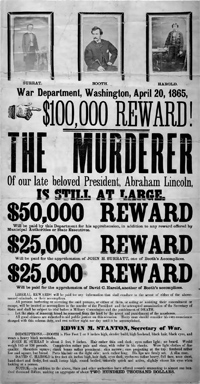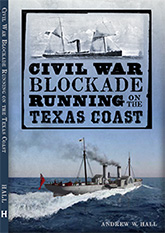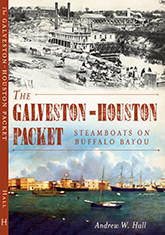“. . . the madman Booth”
 April 15 is the anniversary of the death of Abraham Lincoln. There may be no other event in American history that’s inspired more what-ifs than the question, “what if Lincoln had served a full second term?”
April 15 is the anniversary of the death of Abraham Lincoln. There may be no other event in American history that’s inspired more what-ifs than the question, “what if Lincoln had served a full second term?”
Earlier today I read a post elsewhere that made a passing reference to “the madman Booth.” This, I think, lets him off too easy, as though he were a mere lunatic no one could have stopped, no on could have prevented, and no one could have predicted.
This is wrong.
Booth was not a madman, a random nutter, acting at the behest of voices in his head. His motivations and self-justifications were firmly grounded in the tumultuous events of the time, rather than a fantasy that existed only in his own mind. While the actor was undoubtedly unhinged and irrational on some levels, he didn’t meet the criminal justice system’s definition of insane, then or now. He plotted in considerable detail. He successfully organized a crew — misfits and hangers-on though they were — and held them together for an extended period. He pulled together complex plans for kidnapping and then murder that, while impractical in retrospect, were nonetheless specific and detailed. He convinced two other men to attempt murder as well, though one lost his nerve at the last moment. He had an extended network of sympathizers and supporters who, if not actively involved in the assassination plot, certainly knew of his grumbling and scheming and did nothing to impede him. One wonders, when they first heard that Lincoln had been shot, how many people immediately thought of John Wilkes Booth?
Above all, he genuinely believed that his actions were directly supporting the Confederate war effort, or (after Appomattox) exacting its revenge, and expected his name to go down in history as a great Southern hero. Sadly for our country, South and North alike, some people still see him that way.
What are your thoughts on Booth, his conspirators, and the Lincoln assassination?
_____________






Hi Andy,
In the movie Escape from Sobibor, one man in the death camp says in answer to another man’s question, “Will God forgive us?” as both men prepare with others to make a break (based on a true story)–a break that requires that they kill the guards, “no….the question is will we forgive God?” That is similar to my take on Boothe. Leaving out whether or not God is to be forgiven, I cannot forgive Boothe. God will have to do it. I honestly believe that we would not be having this conversation today had Boothe not assassinated Lincoln. The Civil War would have truly ended, Reconstruction would have been a success, Jim Crow, the KKK, all of the horrendous violence would not have occurred, someone like Barack Obama would have been elected years ago, and we would be like modern Germany, all looking back on a dark period in our history that we overcame. That is pretty tragic all in itself.
Here are a couple of verses from “Down There By The Train” that place Boothe in the realm of Dante’s inferno where I would place him, too. (Sorry, Andy. I am obviously not objective about this and cannot believe that anyone would try to make a hero of Boothe.)
“There’s a place I know where the train goes slow
Where the sinner can be washed in the blood of the lamb
There’s a river by the trestle down by sinner’s grove
Down where the willow and the dogwood grow
You can hear the whistle, you can hear the bell
From the halls of heaven to the gates of hell
And there’s room for the forsaken if you’re there on time
You’ll be washed of all your sins and all of your crimes
If you’re down there by the train
Down there by the train
Down there by the train
Down there by the train
Down there where the train goes slow
There’s a golden moon that shines up through the mist
And I know that your name can be on that list
There’s no eye for an eye, there’s no tooth for a tooth
I saw Judas Iscariot carrying John Wilkes Booth
He was down there by the train
Down there by the train
Down there by the train
Down there by the train
He was down there where the train goes slow
[ From: http://www.elyrics.net/read/j/johnny-cash-lyrics/down-there-by-the-train-lyrics.html ]
Thanks for commenting. Your point about forgiveness is well-taken.
The idea that Booth was a one-off, a lone nutter entirely disconnected both from reality and from the politics and rhetoric of the war around him, has a certain appeal to folks for different reasons. But it just isn’t true.
I agree. It isn’t true. Booth knew what he was doing.
I enjoy your posts, Andy. Sherree
Andy,
In rereading this post and the comments that follow, I see that I misspelled Booth’s surname. In case your blog ends up being archived by the Library of Congress or something, let the record show that that should be “Booth”, not “Boothe”. 🙂 At least I misspelled the name consistently.
I have thought about this post a lot. It is one that stays with you.
I can understand, on a limited basis, how white southerners of the time could have been bitter enough to applaud such an outrageous action, just as white northerners were bitter, too. War does that. I cannot see how anyone in our time can even contemplate such an idea, however. That is disgraceful to me, maybe even traitorous. Lincoln was our President. Interesting that I would think that, perhaps, to some at least, since all of my ancestors were on the Confederate side. Think it I do, though. Think it I do. I am an American, not a Confederate. The Confederacy existed for a period of four years, then ended. The history of southerners, white, black, and Indigenous extends far beyond those four short years into the past, and will extend far beyond them into the future as well.
This all reminds me of when I went to Dallas with a group of people and stated that I wanted to go to the book depository the next day and pay respects to Kennedy, then asked if anyone else wanted to go. One man said, no, he didn’t want to go, that he did not like Kennedy. That wasn’t the point, was my answer, Kennedy was your president. The next day that man didn’t go, but the rest of the group did.
That is a terrible place to stand–in that book depository–just as suggesting that Booth was a hero is a terrible place to stand in memory. Fortunately, not too many people do stand there. Thanks, Andy. Sherree
Don’t worry about the misspelling. If Powers Boothe is offended, I’m sure he’ll let you know. Personally, I’m offended by his participation in the Macgruber movie, so we can call it even.
I’m curious as to how Lincoln’s assassination was received in the South – especially among the former officers of the CSA and men like R.E. Lee. Booth appears to be a firebrand – but he also managed to avoid any of the actual unpleasantness of war.
To this Canadian, he appears as a precursor to the modern-day “chicken hawks” who spout bellicose phrases from the safety of deferments. It’s clear that he thought his act a bold one – but I doubt he was seeking martydom. He had made careful plans for escape and he no doubt expected them to work. Did he expect to be welcomed as a hero? If so, my guess would be that a war-weary Southern population would have disapponted him.
Don’t have time to reply in detail, but Booth absolutely believed he would be seen a hero, the instrument of Southern revenge. Much of what we know about his thoughts come from a dairy he kept during his escape, when he got hold of newspapers that condemned his act.
If you haven’t seen the American Expereince doc on the assassination, it’s very worthwhile.
I’ll try to reply later as to how the event was actually received in the South. Might make a subject for a post on its own.
Here’s what Kate Stone, a Louisiana refugee in Tyler, Texas, thought:
April 28, 1865–We hear that Lincoln is dead. There can be no doubt, I suppose, that he has been killed by J. W. Booth. “Sic semper tyrannis,” as his brave destroyer shouted as he sprang on his horse. All honor to J. Wilkes Booth, who has rid the world of a tyrant and made himself famous for generations. Surratt has also won the love and applause of all Southerners by his daring attack on Seward, whose life is trembling in the balance. How earnestly we hope our two avengers may escape to the South where they will meet with a warm welcome. It is a terrible tragedy, but what is war but one long tragedy? What torrents of blood Lincoln has caused to flow, and how Seward has aided him in his bloody work. I cannot be sorry for their fate. They deserve it. They have reaped their just reward.
May 15, 1865–We hope President Davis is really making his way to this department, as we hear. His presence would give new life to the people. Poor Booth, to think that he fell at last. Many a true heart at the South weeps for his death. Caesar had his Brutus, Murat his Charlotte Corday, and Lincoln his Booth. Lincoln’s fate overtook him in the flush of his triumph on the pinnacle of his fame, or rather infamy. We are glad he is not alive to rejoice in our humiliation and insult us by his jokes. The circumstance of his death forms a most complete tragedy. Many think Andy Johnson worse than Lincoln, but that is simply impossible.
–see Brokenburn: The Journal of Kate Stone, 1861-1868. Edited by John Q. Anderson. Baton Rouge: Louisiana State University Press, 1955, 1972.
Vicki Betts
There’s something about having accomplices which kinda puts the kibosh on insanity from my point of view. Everything about Booth which seems to indicate he was motivated for roughly the same reasons as most of the Confederacy.
To that end, I wonder if that’s somewhat behind the “Booth insanity” myth. Rather than face that Lincoln’s assassin stemmed from a similar philosophy as many southerners held, insanity is substituted. Perhaps somewhat like many other myths around the Civil War. Highly speculative and reductionist, but it’s running through my head right now.
It’s probably a cliche by now, but I can’t help but consider the comparison between Booth and John Brown; both are often called madmen, yet both had at least thought-out their plans in advance and had managed to gather followers to help them; Brown was more violent with his acts in Kansas years before the Harper’s Ferry attack (but his ability to lead that attack in Kansas yet still remain free for the next 3 years & plan the attack shows some signs of at least sanity if not intelligence.)
Brown of course had more religious fanaticism and grandiose plans of a nationwide ending of slavery through bloodshed, while Booth was more focused on how his action would be viewed in the south and his own reputation. Time would prove Brown’s prediction to be correct while Booth did not become the hero he hoped to be.
Both were murderers, who died for their crimes, yet still have some who consider them heroes or martyrs for their respective causes.
Some Southern diarists lamented Booth’s act as portending only more bad things for the defeated South. It’s ironic that Booth, a tragedian, produced the ultimate tragedy for the whole country, but especially for the South.
OT, don’t miss the TSHA’s latest offering: The Handbook of Civil War Texas:
http://www.tshaonline.org/handbook/civil-war#Table_of_Contents
My thoughts are the same as yours.
It’s also interesting that every time we have an assassination now, the same scenario to explain what happened is put out there.
Love, C.
Turns out I grew up just a few miles from the farm Booth grew up on (still there.) No one in the area or at the farm will acknowledge that Booth was born here and grew up here. I never even learned that he grew up where I too grew up until just a few years ago. In that area of Maryland he is viewed as the coward, low life, and terrorist he truly was, and will forever remain.
Yes, slaves where kept in that area on a number of large farms – I even knew a man (he was over a hundred when he passed away) who’s father was a slave but that man (the father) worked his way out of slavery before the civil war started and raised his family just down the road from my childhood home. Their original home (falling apart now and over grown) is on the orginal plantation which is now part of a State Park.
Strange but I found a confedrate army coat button at my childhood house (burried in the yard) – a long story but it was all that remained of a uniform a local Union soldier had acquired and was past down and forgotten. I met the man’s nephew and he knew all about the coat (he died at age 108!) We had a lot of very long lived people there!
Anyone who calls Booth anything more than a coward is the only person who is truely crazy.
Andy,
Great question re: JWB. I’m of the school that Booth, a flamboyant and sane actor, and his crew acted at the behest of the flegling Confederate Secret Service, under direct orders from Mr. Benjamin.
Actually Booth’s assassination of Lincoln, it has been suggested, was either the result of a failed abduction attempt or in retaliation for the Dahlgren affair, the failed Yankee attempt to abduct or murder Jeff Davis and his cabinet.
Because I’m new to this delightful site, do you have anything on the above (the Dalhren raid, Lincoln assassination, etc.) as well as the legitimacy or ill-legitimacy of secession, etc?
I’m interested in folk’s opinions re: the ‘right’ of secession! Best wishes!
Hey Robert, thanks for commenting and thanks for subscribing to the blog. I liked your response to my comment over at LoOG.
We don’t get into discussing the right of secession as a principle, much, as it’s not something that seems constructive to me. What I have observed is that secession and its kissin’ cousin, nullification, never become hot topics in the body politic in the abstract — they’re ALWAYS in response to some bigger, decisive policy/political question, whether it’s 1860 or 2010. It’s those disputes, rather than secession as an abstract notion, that’s more interesting.